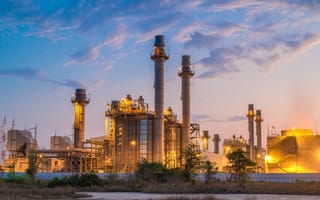For the UK to achieve its legally binding net zero carbon emissions target by 2050, it will rely on innovative energy companies — like the ones listed below — to support its decarbonization strategy.
Top Energy Companies in the UK
- British Gas
- BP
- Octopus Energy
- EDF Energy
- E.ON
- ScottishPower
- SSE
- OVO Energy
- ContourGlobal
20 Top Energy Companies in the UK
Centrica supplies gas and electricity to more than 10 million customers in the UK, Ireland, North America, Scandinavia and the Netherlands. Headquartered in Berkshire, the integrated company also offers energy-related services and low-carbon products as well as access to renewable energy generation and electric vehicle charging through its partners. It serves as the parent company of British Gas, Sainsbury’s Energy and Bord Gáis.
Home Energy is a family-owned energy provider of electricity and natural gas that’s primarily sourced from renewable fuels. Headquartered in Leicester, the company is one of three brands that make up the Net Zero Planet Group, a corporate umbrella centering businesses in building sustainable, energy-efficient systems with low-to-no carbon emissions.
Siemens Energy is a Germany-based energy tech company that builds infrastructure to support more resource-efficient factories, supply chains and energy sites. Its products include power transmission and distribution components like transformers, low-to-high voltage switch gears, compressors, electrolyzers and generators as well as multi-watt wind, steam and gas turbines. With a presence in over 90 countries, the company estimates that one-sixth of the world’s energy generation is based on Siemens technology.
Green-energy platform Ripple Energy enables consumers to purchase co-op shares of large-scale wind farms and solar parks. For as little as £25 and up to 120 percent of one’s annual electricity consumption, buyers can reduce their bills by one quarter on average when investing in projects like the Kirk Hill wind farm, which generates a year’s worth of electricity for one household in less than 10 minutes.
Exagen builds and manages utility-scale solar farms and their accompanying battery storage facilities that feed renewable energy into the grid. The company primarily partners with landowners — often agricultural businesses — to develop installations that not only offer them an additional stream of sustainable income and access to green energy, but also biodiversity gains up to 85 percent. To date, Exagen’s energy sites have developed 6 gigawatts of renewable energy.
EDF Energy is the largest provider of zero-carbon electricity in the UK, using wind, solar and nuclear sources to generate about 18.4 percent of the country’s energy supply. The company’s portfolio also includes renewables, battery storage and conventional thermal power, but holds a significant focus on low-carbon energy production from its eight nuclear power plants. In fact, EDF is constructing the first brand new nuclear power plant in 20 years, which will provide electricity for 6 million homes for a 60-year period.
So Energy offers 100 percent renewable power at a value rate, incentivizing consumers to make the switch from carbon-based energy sources. The founder-operated startup, which generates its energy supply from wind, solar, hydro and biomass sources, has generated more than 4,400 gigawatts of energy from 2016 to 2023. Through its website, So Energy allows customers to vote on the type of renewable energy they prefer to create a more engaging and personalized experience.
Eco Energy World is a global renewable energy provider that uses utility-scale photovoltaics and battery storage systems to offer solar power on a macro scale. Founded in 2012, the company also identifies greenfield sites, establishes grid connections and permits, secures financing and contracts for solar field construction. To date, EEW has developed about 1.4 gigawatts across Europe and Australia.
E.ON is a Germany-based utility company that generates gas and electricity to more than 47 million customers across 30 different countries. The company’s distribution channels span 1.6 million kilometers in energy networks, offering infrastructure solutions to municipalities and industries alike, as well as e-mobility services, smart metering and gas tariffs. E.ON also has plans to supplement its energy network with 10 gigawatts of green hydrogen by 2030.
In its first eight years of business, Octopus Energy became the largest supplier of electricity in the UK and second largest in gas. Headquartered in London, the renewable-energy company is known for its innovative tariffs, like its price-cap protection tracker that uses a smart meter to scan fluctuating wholesale prices and overnight “smart charging hours” for EVs and homes. It has also founded an open energy-research lab developing low-carbon energy systems, the Centre for Net Zero, and operates over 300 renewable-energy sites worldwide. From 2018 to 2023, the services provided by Octopus Energy offset over 1 million tons of carbon emissions.
OVO Energy is a Bristol-based energy company that supplies gas and electricity to domestic housing across the UK. Founded in 2009, the company offers energy-saving products, like smart meters, home and heating services as well as renewable energy options, such as solar panels and electric vehicle charging solutions. Through its Plan Zero initiative, OVO aims to become a net-zero carbon business by 2035. Since 2018, the company has halved its operational carbon emissions, with the majority of its offices now powered by 100 percent renewable energy.
Shell is one of the largest oil and gas companies in the world, delivering about 10 percent of the UK’s supply. The London-based company is most recognizable from its 1,000 service stations across the country, where 3.5 million customers fuel up on a weekly basis. Shell is also taking part in developing electric mobility infrastructure, carbon capture tech and low-to-zero-carbon solutions, like a floating, offshore wind-power farm designed to generate 5 gigawatts.
Headquartered in Glasgow, ScottishPower distributes and supplies electricity and gas in the United Kingdom. The company generates more than 1,900 megawatts of electricity from its 38 onshore wind farms to power houses, businesses and the grid. As the transmission owner for the south of Scotland, ScottishPower is responsible for transferring high-voltage electricity from power plants to its 150 substations at lower voltages.
Drax Group is the largest provider of renewable energy in the UK. The Yorkshire-based company produces and sells organic wood-pellet biomass, hydro-electric and pumped hydro storage assets to businesses. It also develops bioenergy with carbon capture and storage technology, with plans to become carbon negative by 2030.
BP, formerly British Petroleum, is one of the world’s largest oil and gas companies. Operating out of 70 countries, the multinational conglomerate specializes in the exploration, production, refining and marketing of oil and gas. Founded in 1909, BP has diversified its portfolio to include renewable energy sources, such as wind and solar power, while producing an average of 1.1 million barrels of fossil fuels per day.
National Grid owns and operates 55,500 square kilometers of transmission networks across England and Wales. Founded in 1990, the company delivers electricity to more than 8 million customers from various types of power generation sources, from natural gas and nuclear stations to biomass and wind turbines. The National Grid plays a crucial role in the country’s energy infrastructure, and is currently future-proofing with grid modernization and renewable energy projects for net-zero operations by 2050.
International energy company ContourGlobal powers 6.3 gigawatts of electricity across 20 countries. The company produces a mix of energy sources, from traditional fossil fuels like coal, natural gas, diesel to renewable technologies, including wind, solar, hydro and battery storage, as well as thermal sources like natural gas and coal, to strike a balance between environmental sustainability and energy security at an affordable cost.
When British Gas was established in 1812, it became the world’s first utility company. Today, it remains the UK’s largest supplier of gas, powering over 8 million houses and businesses. Aside from gas and electricity, the company, a subsidiary of Centrica, installs and services boilers, central heating, plumbing, drains and assorted home appliances as well as renewable energy solutions, like smart meters and solar panels. By 2045, British Gas aims to operate at zero carbon emissions company wide.
ENGIE is a French utility company that’s been active in the UK for more than 20 years. From conception to operation, the company specializes in power plants that run on both natural gas and renewable sources, while offering energy management and supply services to organizations of all sizes. To date, ENGIE has installed 103 gigawatts of power production capacity.
SSE is a Scottish energy company that generates, transmits, distributes and supplies electricity and gas across the UK and Ireland. The company provides more than 10,200 annual gigawatt hours using a diversified portfolio of renewable energy, which includes both on-and-offshore wind farms, hydropower, solar energy and flexible thermal generation in support of the country’s transition to a net-zero carbon future. Additionally, SSE is also involved in developing advanced energy technologies, including battery storage, hydrogen-fired solutions and carbon-capture tech.
Explore Our UK Coverage
Built In London | Built In Manchester | Built In Bristol | Built In Edinburgh | Built In Belfast






















